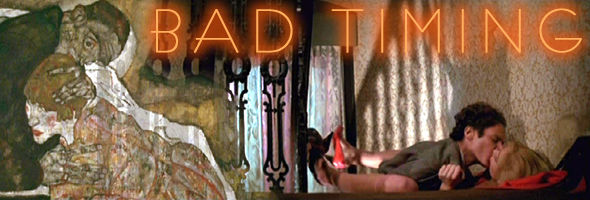
Colour, 1980, 117m. / Directed by Nicolas Roeg / Starring Art Garfunkel, Theresa Russell / Criterion (US R1 NTSC) / WS (2.35:1) (16:9), Carlton (UK R2 PAL) / WS (2.35:1)
Skipping back and forth through time, we begin as psychiatrist Alex Linden (Garfunkel) accompanies the nearly dead Milena (Russell) in an ambulance to the hospital. Catatonic from an overdose, Milena undergoes a tracheotomy and other medical ministrations while Alex looks on and recalls their stormy relationship, which began with a chance meeting at a party and soon degenerated into a series of psychologically violent
The actual opening of Bad Timing is one of the finest opening credits sequences ever filmed, as Roeg's gliding scope compositions capture Garfunkel and Russell studying Gustav Klimt paintings to the accompaniment of Tom Waits' "An Invitation to the Blues." This powerful curtain raiser has nothing to do with the film proper on a narrative level, but it perfectly sets the aesthetic tone; the images of male forms caressing slumbering women trapped in lavish, ornate fabrics are echoed in Roeg's own visual scheme (relying heavily on Klimt-like golds and browns) and the infamous final revelation (incorrectly referred to as necrophilia by many sources, though the distinction here is pretty thin), a truly startling sequence for two mainstream actors. The fact that Roeg and Russell actually fell in love during filming and were married shortly afterwards is rather staggering considering what his leading lady endures here; Russell was never this powerful on film again, though the two certainly tried again on film several more times. Garfunkel is adequate enough in the lead, with his eyes communicating a great deal during his more introspective moments, though one can only wonder what a more seasoned actor like, say, Robert De Niro could have accomplished with the role.
Barely released on video in the UK and completely unavailable on home video in the US for decades (with only occasional TV screenings late at night), Bad Timing (subtitled A Sensual Obsession in American theatres) nevertheless built up a strong cult following thanks to the video grey market. Unfortunately its astonishing scope framing was always subjected to clumsy panning and scanning, though eventually the first DVD from Carlton restored that oversight with a non-anamorphic transfer. Most welcome is the disc's inclusion of optional English subtitles which also identify the dizzying array of pop, classical, and world music selections on the soundtrack (some of which, such as The Who's "Who Are You," could account for this film's home video tribulations). The film's running time has been the subject of speculation for years, with press materials listing it at 124, 122 and 117 minutes depending on the venue. The Carlton disc clocks in at 117 in PAL, though rumours abound concerning additional graphic footage shot but omitted at the last minute. Considering that this version already contains full frontal nudity and an unforgettable montage of Russell's throat operation intercut with her at the heights of passion, one can only wonder what might have landed on the cutting room floor. The subsequent, far more lavish Criterion edition in the US runs a bit longer at 122 minutes; it's no more explicit (at least in the main feature) so the longer running time can possibly be attributed to the switch in video standards. However, the disc does offer a bounty of deleted material, including a bizarre, oily extension of the party scene where Milena and Alex meet and an additional bed scene with the two leads that offers more Garfunkel exposure than many viewers may prefer. The main feature looks significantly more colorful on the Criterion disc, with more robust black levels and additional detail as well. Here the optional English subtitles replicate all of the song lyrics but don't identify the songs themselves, completely inverse to the British DVD.
Along with the deleted scenes, the supplemental section includes an informative new interview with Roeg and producer Jeremy Thomas, who discuss the film's unorthodox shooting method and the severe demands placed on everyone involved. Much of this is corroborated by Russell, who contributes a separate video interview in which she candidly talks about making the film in a chat that will leave fans beaming. Also included is a production photo gallery augmented with poster art and a booklet containing an essay by film historian Richard Combs and a reprinted Garfunkel interview about the film. Both DVD incarnations include the original trailer, which does what it can to sell an exceptionally difficult but rewarding film.
Color, 1983, 129m. / Directed by Nicolas Roeg / Starring Gene Hackman, Theresa Russell / MGM (US R1 NTSC) / WS (1.85:1) (16:9) / DD2.0
From a visual and editing standpoint, Eureka is really the last great Roeg film. The opening hour is a frenzy of beautifully jagged editing, stylized camera zooms, and visual free association that rivals the best of his earlier films. Hackman's snowy ordeal at the beginning is a particular marvel, integrating a gunshot suicide, a heavenly chunk of ice, and a prophetic, dying prostitute into a series of bizarre tableaux better seen than described. Russell and Hauer's romance is no less surreal, with the aforementioned voodoo orgy stopping the film in its tracks for a good five minutes as
After sitting on the shelf for three years, Eureka was finally released by United Artists on the heels of a later and far more genteel Roeg film, Insignificance. It languished on home video in a rather dull transfer for years, but the widescreen DVD makes up for it with a brilliant, colorful transfer (complete with that beloved early '80s grain, though it's fairly mild). The surround audio also serves the movie well, especially Stanley Myers' beautiful, evocative score. The only extra is the U.S. theatrical trailer, which tries to sell the film as best it can.
After coaxing strong performances from pop music personalities in 1970's Performance (Mick Jagger) and 1976's The Man Who Fell to Earth (David Bowie), director Roeg found his next leading man in the unlikely form of Art Garfunkel, whose previous experience was limited to two excellent Mike Nichols projects (Catch-22 and Carnal Knowledge). Both men got far more than they bargained for with Bad Timing, a notoriously
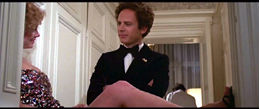 troubled film which pushed all of its primary talent into very dangerous personal and professional territory. Reviled by its distributor, critically lambasted, and so extreme that both of its leads were desperate to be released from their contracts, this largely off-the-cuff study in sexual obsession pushes Roeg's trademark time-fractured editing to nearly unbearable extremes, creating a film still capable of wildly polarizing viewers.
troubled film which pushed all of its primary talent into very dangerous personal and professional territory. Reviled by its distributor, critically lambasted, and so extreme that both of its leads were desperate to be released from their contracts, this largely off-the-cuff study in sexual obsession pushes Roeg's trademark time-fractured editing to nearly unbearable extremes, creating a film still capable of wildly polarizing viewers.
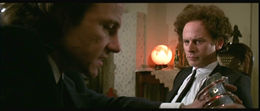 games with sex and power becoming interchangeable. Two other men are also involved: Milena's much older husband, Stefan (Denholm Elliott), and during her operation, the investigating police officer (Harvey Keitel) who tries to account for over an hour of lost time between Milena's overdose and Alex's telephone call for help.
games with sex and power becoming interchangeable. Two other men are also involved: Milena's much older husband, Stefan (Denholm Elliott), and during her operation, the investigating police officer (Harvey Keitel) who tries to account for over an hour of lost time between Milena's overdose and Alex's telephone call for help.
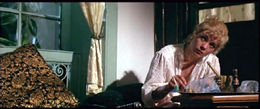 Interestingly, Bad Timing could be considered the first sexual warfare film to explore the concept of two people literally exhausting themselves to death (or at least coming perilously close); while Who's Afraid of Virginia Woolf? and its like depicted relationships as a battle, Roeg's film creates a new terrain in which love is a consuming, destructive, time-swallowing force when the partners are essentially incompatible. One need only look at the following year's more overtly horrific Possession to see the difference (that film also uses the split of Communist and Western urban culture as an emotional mirror), or such later studies in sexual/emotional exhaustion as Bitter Moon and Crash, where empty thrills must consume a couple when their hearts have long since stopped beating.
Interestingly, Bad Timing could be considered the first sexual warfare film to explore the concept of two people literally exhausting themselves to death (or at least coming perilously close); while Who's Afraid of Virginia Woolf? and its like depicted relationships as a battle, Roeg's film creates a new terrain in which love is a consuming, destructive, time-swallowing force when the partners are essentially incompatible. One need only look at the following year's more overtly horrific Possession to see the difference (that film also uses the split of Communist and Western urban culture as an emotional mirror), or such later studies in sexual/emotional exhaustion as Bitter Moon and Crash, where empty thrills must consume a couple when their hearts have long since stopped beating.

What do hot voodoo, a gory blowtorching and decapitation, world-weary whores, and a hysterical court trail have in common? They're all elements in Eureka, one of the maddest studio films ever made. Somehow after the troubled releases of The Man Who Fell to Earth and Bad Timing, Roeg still managed to get major financing for a (comparatively) star-studded production, loosed
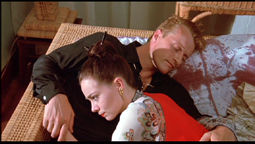 based on Marshall Houts' celeb-studded true crime book, Who Killed Sir Harry Oakes? Here the world-weary zillionaire is fictionalized as Jack McCann (Hackman), a single-minded prospector whose years in the tundra finally pay off when he strikes gold. Years later, his wealth has brought him little happiness as the one goal in his life has been accomplished; even his wife (Jane Lapotaire) and daughter, Tracy (Russell), offer little solace. Harry is deeply disturbed by Tracy's romance with suave playboy Claude (Rutger Hauer), whom the protective dad sees as a possible usurper to McCann's fortune and very soul. Meanwhile thug heavies D'Amato (Mickey Rourke) and Mayakofsky (Joe Pesci) lean on Harry for a piece of the action, leading to a gruesome evening which leaves our characters either dead, guilty of murder,
based on Marshall Houts' celeb-studded true crime book, Who Killed Sir Harry Oakes? Here the world-weary zillionaire is fictionalized as Jack McCann (Hackman), a single-minded prospector whose years in the tundra finally pay off when he strikes gold. Years later, his wealth has brought him little happiness as the one goal in his life has been accomplished; even his wife (Jane Lapotaire) and daughter, Tracy (Russell), offer little solace. Harry is deeply disturbed by Tracy's romance with suave playboy Claude (Rutger Hauer), whom the protective dad sees as a possible usurper to McCann's fortune and very soul. Meanwhile thug heavies D'Amato (Mickey Rourke) and Mayakofsky (Joe Pesci) lean on Harry for a piece of the action, leading to a gruesome evening which leaves our characters either dead, guilty of murder, 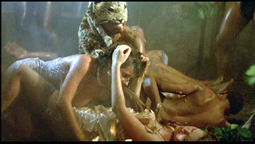 or stuck in a courtroom.
or stuck in a courtroom.
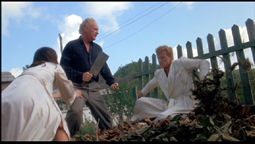 the viewer is assaulted with snakes and writhing bodies. Then we have the aforementioned murder, which won't be much of a shock for anyone who pays attention to the source novel's title; it's a prolonged, nasty piece of business that could have stepped out of Lucio Fulci's Contraband. Unfortunately the trial business is something of a letdown, with Russell's heartfelt but utterly mad climactic speech provoking more head scratching than the soapiest Douglas Sirk dialogue. A one-of-a-kind experience, to be sure.
the viewer is assaulted with snakes and writhing bodies. Then we have the aforementioned murder, which won't be much of a shock for anyone who pays attention to the source novel's title; it's a prolonged, nasty piece of business that could have stepped out of Lucio Fulci's Contraband. Unfortunately the trial business is something of a letdown, with Russell's heartfelt but utterly mad climactic speech provoking more head scratching than the soapiest Douglas Sirk dialogue. A one-of-a-kind experience, to be sure.
